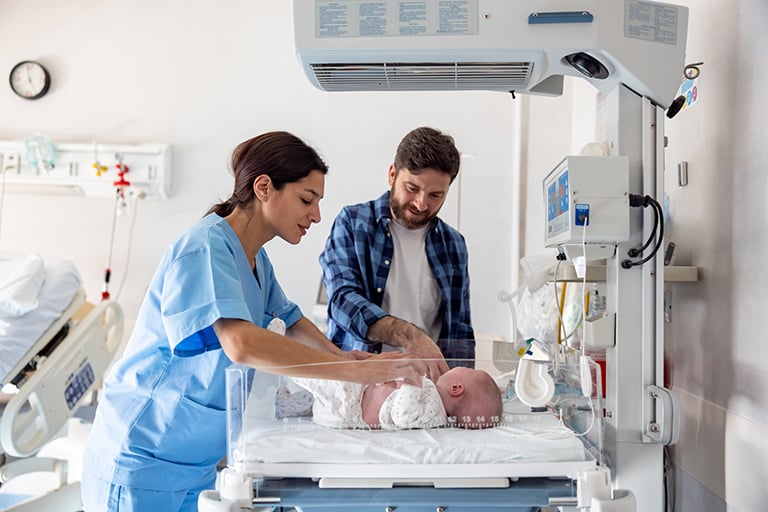5 Focus Areas When Diapering a NICU Baby
*Content Sponsored by Huggies® Brand, Kimberly-Clark Corporation*
It was 7:45am. Tammy, my neonatal nurse colleague, approached me as I was catching up on documentation. She said, “Will you see baby Isaiah with me at 8am? He’s very unstable and I know he’ll do better if we work together to support him.”
Isaiah was a sweet 2-day-old boy, born at 25 weeks gestation, weighing about 700 grams. Even something as ‘routine’ as changing his diaper caused him to become bradycardic. In order to help Isaiah tolerate such care, we had to support him both medically and developmentally.
Tammy and I worked in tandem to do just that. As she expertly listened to his heart and lungs, suctioned him, and changed his diaper, I sculpted the rest of his body into a facilitated tuck so that his sensory and motor systems were supported, keeping him more stable than if he was left sprawled out – his immature system incapable of fighting gravity and self-comforting independently.
Meanwhile, I observed his movement patterns, symmetry, and the effect of the environment on his systems.
Fortunately, this intentional dance of interactions between nurse, therapist, and infant kept Isaiah stable and comfortable.
Two years ago, I joined the Huggies® Nursing Advisory Council (HNAC), a multidisciplinary group of experts in neonatal care, including a NICU parent. Together we identified a gap in understanding and resources about developmental care in the context of diapering, especially for premature infants. Studies show that standard caretaking procedures, such as diapering, can lead to an increase in pain and stress responses in premature infants.1,2 However, developmental care measures taken during diapering have been associated with improved comfort in premature infants including grasping, postural support and others.3
A mindful diaper change that incorporates the science and habits of developmental care is the perfect way to introduce these skills to an infant’s family so they can play an active role in care while in the NICU, and continue these practices at home.
To help support nurses and other healthcare providers, the Huggies Nursing Advisory Council created Every Change Matters™: A Guide to Developmental Diapering Care, the first research review to consider diapering within the context of developmental care.
Every Change Matters™ operationalizes elements of evidence-based skin care and developmental diapering care through five areas of focus based on developmental theory:
- Calm and Clean – Create and maintain an optimal healing environment that includes positive sensory experiences, physical privacy for families and parent involvement.
- Change and Check – Exercise mindfulness during daily physical health activities such as skin care, postural support and feeding.
- Comfort - Assess infant’s cues related to stress and pain. Engage parents in learning to recognize these cues and how to offer comfort and support to their infant.
- Champion Sleep – Promote and protect sleep, which plays a vital role in cognitive, psychomotor and temperament development in infants.
- Confidence and Closeness – Coach parents to become “confident caregivers” through family-integrated care by encouraging them to perform skin assessment, get to know their infant’s behaviors and cues, and provide comforting techniques.
We also built the Every Change Matters™ Nurse Education Program, a quick 30-minute training tool, so nurses and HCPs can apply these techniques in their own hospitals. It’s a great resource that provides a deep dive into developmental diapering knowledge and skills, as well as strategies to teach and engage parents in caring for and bonding with their infant. Nurses have found it to be useful, but its content is applicable for all members of the infant care team.
For more information on Every Change Matters™, or to download the Nurse Education Program, please visit https://www.huggieshealthcare.com/en-us/education-and-research/education/nicu/nurse-education-program.
Your engagement with these resources is one powerful way to ensure that Infants like Isaiah continue to benefit from highly specialized, consistent, and collaborative care.
Questions? Comments?
We would love to hear them!






